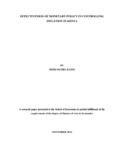| dc.description.abstract | This study determines the effectiveness of monetary policy in controlling inflation in Kenya.
This study employs regression research design. It uses secondary data on inflation, exchange
rate, Treasury bill rate, money supply, GDP growth, oil prices and world food prices. According
to the study, the coefficient of money supply is positive but statistically insignificant at 5% level
in controlling inflation rate in Kenya. The coefficient for GDP is negative and is also statistically
insignificant at 5% level. However, the result indicated that nominal exchange rate is the major
factor in controlling inflation in Kenya. The study recommended that policy makers should
concentrate on nominal exchange rate. Instead of focusing on world food prices, the government
should consider measures aimed at increasing food supply. This involves providing credit
facilities to farmers, subsidized fertilizers and providing new technologies to farmers to increase
food supply | en_US |

